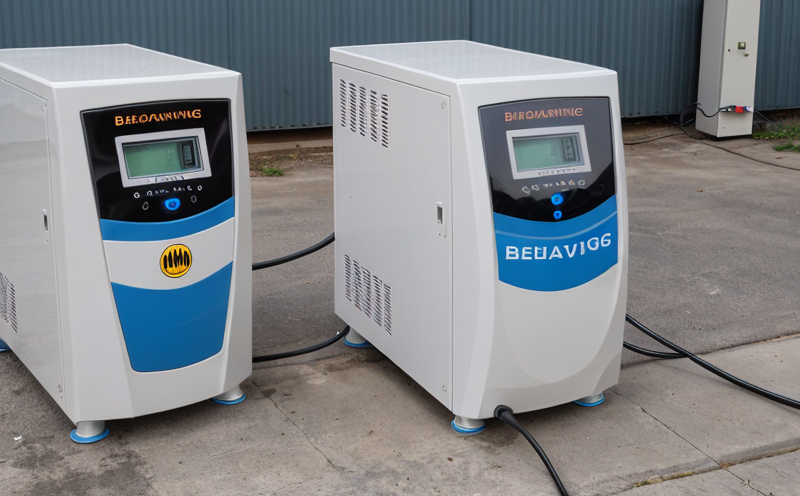DIN 40740 Charging and Discharging Behavior Testing of Stationary Nickel-Cadmium Batteries
The DIN 40740 standard provides a comprehensive framework for the testing of charging and discharging behavior in stationary nickel-cadmium (NiCd) batteries, which are widely used in industrial applications such as uninterruptible power supplies (UPS), emergency lighting systems, and backup power solutions. This service ensures that these batteries meet stringent performance criteria to ensure reliability and longevity.
Stationary NiCd batteries play a crucial role in critical infrastructure where continuous operation is essential. Their robust design allows them to withstand harsh environmental conditions without compromising on performance or safety. DIN 40740 specifically targets the charging and discharging behavior of these batteries, which directly impacts their operational efficiency and lifespan.
The testing process involves several steps that are designed to simulate real-world usage scenarios. The first step is the initial charge test, where the battery is charged under controlled conditions to ensure it reaches its nominal capacity. This is followed by a series of discharge cycles, each followed by recharging, to evaluate how the battery performs over time. During these tests, critical parameters such as voltage, current, and temperature are continuously monitored.
One of the key aspects of DIN 40740 is its emphasis on safety. The testing protocol includes checks for potential hazards, ensuring that batteries do not overheat or short-circuit during charging or discharging. This is achieved through rigorous monitoring and adherence to predefined thresholds. Additionally, the standard requires periodic inspections to ensure that all components are functioning correctly.
The results of these tests provide valuable insights into the battery's performance characteristics. For instance, the discharge curve helps in understanding how quickly a battery can lose its capacity under different loads. This information is crucial for optimizing the design and operation of systems that rely on these batteries. By following DIN 40740, laboratories ensure that their testing meets the highest industry standards.
The comprehensive nature of DIN 40740 makes it an indispensable tool in ensuring the reliability of stationary NiCd batteries. It not only helps in identifying potential issues early but also enhances the overall performance and lifespan of these batteries. This is particularly important in sectors where downtime can be costly, such as data centers and telecommunications.
Moreover, the standard's emphasis on safety ensures that users are aware of any risks associated with the battery’s operation. By adhering to DIN 40740, laboratories provide a service that not only meets regulatory requirements but also enhances customer confidence in the quality and reliability of their products.
Applied Standards
| Standard Number | Description |
|---|---|
| DIN 40740-1 | General requirements for the testing of charging and discharging behavior. |
| DIN 40740-2 | Specific methods for charging tests. |
| DIN 40740-3 | Specific methods for discharge tests. |
| DIN 40740-4 | Safety requirements and precautions during testing. |
The DIN 40740 series of standards provides a detailed framework that ensures comprehensive testing of the charging and discharging behavior of stationary NiCd batteries. Each part of the standard focuses on different aspects, from general requirements to specific methods and safety measures. This structured approach guarantees that all critical factors are considered during the testing process.
Why Choose This Test
- Ensures compliance with international standards for stationary NiCd batteries.
- Provides detailed insights into charging and discharging behavior, optimizing system performance.
- Guarantees the safety of users by identifying potential risks early in the testing process.
- Aids in the design and optimization of systems that rely on NiCd batteries.
The DIN 40740 Charging and Discharging Behavior Testing is a critical service for quality managers, compliance officers, R&D engineers, and procurement professionals. By choosing this test, organizations can ensure they are meeting regulatory requirements while also enhancing the performance and reliability of their products. This testing ensures that batteries perform consistently under various conditions, reducing the risk of failures in critical applications.
International Acceptance and Recognition
- DIN 40740 is widely recognized in Europe for its rigorous testing protocols.
- The standards are also adopted by other international organizations such as IEC (International Electrotechnical Commission).
- Multinational corporations often require compliance with DIN 40740 to ensure consistent quality across their global operations.
The acceptance and recognition of DIN 40740 extend beyond Europe, making it a valuable standard for companies operating in multiple countries. Its international adoption underscores its significance in the testing industry. Laboratories that offer this service can leverage the reputation and credibility associated with DIN standards, thereby enhancing their market position.





